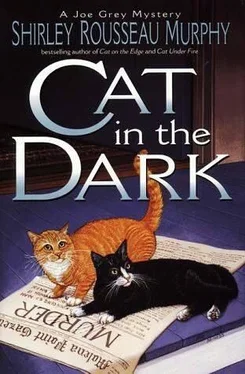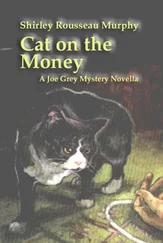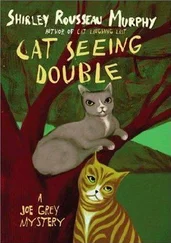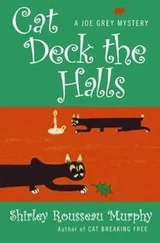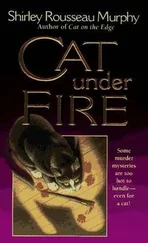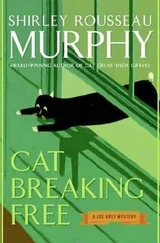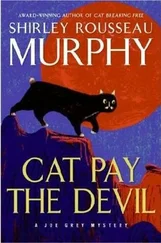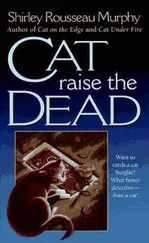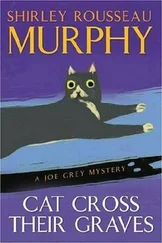But the two cats did bother her. So often they appeared bound somewhere with intense purpose-bound on a specific errand, not just wandering. Cats not aware only of the moment but focused on some future and urgent matter.
These, Charlie Getz, are not sensible thoughts you're having. You ought to be making a building supply list.
Yet even as she watched, the cats rose and trotted purposefully away across the patio in a most responsible and businesslike manner.
Maybe they knew it was nearly quitting time. Maybe they were waiting for Clyde; he usually showed up about now. A dog would go to the door at the time his master was due home, so why not a cat? A dog would show up at the bus stop to escort his kid home from school. Certainly cats were at least as smart as dogs-she'd read some startling things about the abilities of cats. She watched the cats cross the patio, looking up at Winthrop Jergen's windows as if watching the flashes of Pearl Ann's polishing cloth. Sweeping across the glass, it must look, to them, like some trapped and frantic bird.
But suddenly they glanced back and saw her looking out. They turned away abruptly to sniff at the edge of a flower bed. Turned away so deliberately that she felt as if she'd been snubbed. Had been summarily dismissed.
Amused by her own imaginings, she opened the kitchen door and told the cats, "Clyde's not here yet."
They looked around at her, their eyes wide and startled.
"He's bringing some kitchen cabinets. If you're looking for a ride home, just wait around, guys."
The cats gave her a piercing look then closed their eyes, in unison, and turned away-as if the sound of her voice annoyed them. And when, half an hour later, Clyde arrived with the cabinets, Joe and Dulcie had disappeared.
"They'll come home when they're ready," he said.
"Don't you worry about them? Don't you wonder where they go?"
"Sure I worry. They're cats. People worry about their cats. Every time some village cat doesn't show up for supper, you can hear his owner shouting all over Molena Point."
He looked at her helplessly. "So what am I supposed to do? Follow Joe around? I can't lock him in the house, Charlie. Do that, and I might as well put him in a cage."
He seemed very intense about this. Well, she thought, Clyde loved his cat.
They unloaded the kitchen cabinets and set them in the front apartment; this was the only apartment to get new cupboards, thanks to the last tenant who had painted the old ones bright red. The new units were pale oak and prefinished. When Clyde was ready to head home, the cats were nowhere to be found, though he shouted for Joe several times. If the tomcat was around, he would usually come trotting to Clyde's summons, as responsive as any dog. Clyde called him again, waited, then swung into his truck.
She stared at him.
"They'll come home when they feel like it." He searched her face for understanding. "I can't keep him confined, treat him like an overcontrolled lap dog. What good would Joe's life be, if I told him what to do all the time?"
She watched him turn the truck around at the dead end and pull away toward the village, his words resonating strangely. What good would Joe's life be, if I told him what to do all the time?
A puzzling turn of phrase. For some reason, the question, thus stated, left her filled with both unease and excitement.
Tossing some tools in through the side door of the van, she went back inside to get a ladder. Slipping it in on top of the tools, she pulled the door closed. She wanted to hang some drawings tonight and put up bookshelves. As she locked up the building, she called the cats, checking each apartment so not to shut them in.
She didn't find them. No sign of the little beasts. She didn't know why she worried about them. As Clyde said, they were off hunting somewhere.
But when she slid into her van, there they were on the front passenger seat, sitting side by side, watching her as expectantly as a taxi fare waiting for the driver, urging him to get a move on.

JOLLY'S ALLEY was no longer a pretty retreat for either tourist or village cat. Beneath the darkening sky where the first stars shone, the cozy brick lane with its little shops looked like a garbage dump. The light of its two wrought-iron lamps shone down upon a mess of greasy paper wrappers, broken eggshells, sandwich crusts, and chewed chicken bones. Wadded paper napkins and broken Styrofoam cups spilled from the two overturned refuse cans, and the smears of cold spaghetti and slaw and potato salad were stuck liberally with tufts of torn-out cat fur-a dozen colors of fur, telling the tale of a huge battle.
Joe and Dulcie, pausing at the alley's entrance, surveyed the mess with amazement, then outrage. Dulcie's ears went back and her tail lashed. Joe crouched as if to spring on whatever feline culprit remained.
But no culprit was visible, the battling cats had fled. Only the tufts of fur told the story, and their pawprints deep in the potato salad-and the stink of fear that lingered, as sharp as the smell of gunpowder after a frontline skirmish.
And, stronger even than the fear-stink, was the odor of the perpetrator-the belligerent reek of the black tomcat.
Sniffing Azrael's scent, Joe and Dulcie padded across the greasy bricks, peering into the shadows beneath the jasmine vine, searching for him.
Suddenly above them a shadow exploded between the rooftops and dropped down within the jasmine vine, dark and swift.
The black torn sauntered out of the foliage, his bullish shoulders swaggering, his amber eyes burning. Looking around at the devastation, he smiled and licked his whiskers.
Joe's growl was deep. "I suppose you waited until all the cats congregated for an evening's snack, then attacked them. Did you trap the smallest ones behind the garbage cans, so you could bloody them?"
Azrael widened his amber eyes. "And what business is it of yours, little cat? What are you, keeper of the village kitties?" Crouching, he circled Joe, his teeth bared, his eyes blazing.
Joe leaped, biting into Azrael's shoulder, raking his hind claws hard down Azrael's belly. Azrael clawed him in the neck. They spun, a tangle of slashing and screaming, then Azrael had Joe by the throat, forcing him down. Joe twisted free and bit him in the flank as Dulcie lunged into the fray. Together they pinned the tomcat. Under their violent double assault, he went limp. When they drew back, he fled to a safer position.
Now suddenly he was all smiles, waving his tail, curving and winding around a lamppost, the change swift and decisive. Chirruping and purring, he fixed his gaze on Dulcie.
"If I had guessed, my dear, that you would be here this evening, we could have feasted together-after I routed that rabble, of course. Or perhaps," he said softly, "you would have enjoyed that little skirmish-a little playful challenge to get your blood up. Hold!" he said as Joe moved to attack. "I have news. Information that will interest you."
But Joe leaped tearing at Azrael's ear and shoulder, and again the two were a screaming whirlwind-until the deli door crashed open and George Jolly ran out swinging a bucket. A cascade of dishwater hit them. Azrael bolted under a bench. Joe backed away, shocked, licking greasy dishwater from his whiskers.
"Look at this mess! At the mess you cats made. "Jolly fixed his gaze on Joe. "What kind of behavior is this? I go away for half an hour and you trash my alley! And on a Sunday, too-with the village full of visitors. You! I'd thought better of you, gray tomcat. Why would you do this?"
He looked hard at Dulcie. "Tomcats! Stupid fighting tomcats. All this over a lady? Shame. For shame." He shook his head sadly. "I feed you no more, you tomcats. I feed no one. You disappoint me. You're nothing but common street rowdies!"
Читать дальше
